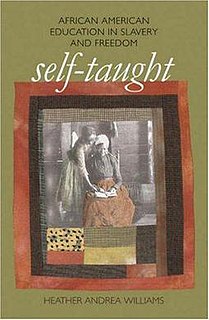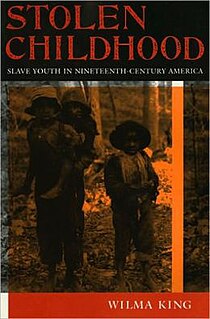 W
WAmerican Slavery as It Is: Testimony of a Thousand Witnesses is a book written by the American abolitionist Theodore Dwight Weld, his wife Angelina Grimké, and her sister Sarah Grimké, which was published in 1839.
 W
WThe Anti-Slavery Alphabet is an alphabet book published in 1846 by the Philadelphia Female Anti-Slavery Society (PFASS). It was written by two of the society's members, Hannah and Mary Townsend, with the intention of encouraging abolitionist ideas in young children.
 W
WBlack Rednecks and White Liberals is a collection of six essays by Thomas Sowell. The collection, published in 2005, explores various aspects of race and culture, both in the United States and abroad. The first essay, the book's namesake, traces the origins of the "Ghetto" African American culture to the culture of Scotch-Irish Americans in the Antebellum South. The second essay, "Are Jews Generic?", discusses middleman minorities; while "The Real History of Slavery" discusses the timeline of abolition of slavery and serfdom. The last three essays discuss the history of Germany, African-American education, and criticism of multiculturalism.
 W
WThe Cotton Plantation Record and Account Book is a best-selling and pioneering guide to farm accounting in the antebellum cotton-producing regions of the United States. It was first published in 1847 or 1848 by Thomas Affleck (1812-1868), a Scottish immigrant and owner of the Glenblythe Plantation in Gay Hill, Washington County, Texas. The book contains a detailed system, including blank tables to be filled in, that allowed plantation owners to track the efficiency of their production. It also includes essays on various aspects of plantation management, such as the proper care and discipline of slaves.
 W
WDays Of Jubilee: The End of Slavery in the United States is a 2002 book by Patricia McKissack and Fredrick McKissack which sets out the history of Abolitionism in the United States.
 W
WThe Delectable Negro: Human Consumption and Homoeroticism within U.S. Slave Culture is a 2014 book by Vincent Woodard. The book explores the homoeroticism of both literal and figurative acts of human cannibalism that occurred during slavery in the United States.
 W
WThe Fiery Trial: Abraham Lincoln and American Slavery is a historical non-fiction book written by American historian Eric Foner. Published in 2010 by W. W. Norton & Company, the book serves as a biographical portrait of United States President Abraham Lincoln, discussing the evolution of his stance on slavery in the United States over the course of his life. The Fiery Trial, which derives its title from a State of the Union address by Lincoln, was the 22nd book written by Foner, the DeWitt Clinton Professor of History at Columbia University. It was praised by critics and won the 2011 Pulitzer Prize for History, the Bancroft Prize, and the Lincoln Prize.
 W
WThe Hemingses of Monticello: An American Family is a 2008 book by American historian Annette Gordon-Reed. It recounts the history of four generations of the African-American Hemings family, from their African and Virginia origins until the 1826 death of Thomas Jefferson, their master and the father of Sally Hemings' children.
 W
WJohn Brown is a biography written by W. E. B. Du Bois about the abolitionist John Brown. Published in 1909, it tells the story of John Brown, from his Christian rural upbringing, to his failed business ventures and finally his "blood feud" with the institution of slavery as a whole. Its moral symbolizes the significance and impact of a white abolitionist at the time, a sign of threat for white slave owners and those who believed that only blacks were behind the idea of freeing slaves.
 W
WA Key to Uncle Tom's Cabin is a book by American author Harriet Beecher Stowe. It was published to document the veracity of the depiction of slavery in Stowe's anti-slavery novel Uncle Tom's Cabin (1852). First published in 1853 by Jewett, Proctor & Worthington, the book also provides insights into Stowe's own views on slavery.
 W
WLincoln and Darwin: Shared Visions of Race, Science, and Religion is a 2010 book by James Lander about the lives and views of Abraham Lincoln and Charles Darwin.
 W
WThe Making of Robert E. Lee by Michael Fellman is a biography of the famous Confederate general. It looks mostly at his character and beliefs. It says relatively little about the details of particular battles, though it speculates about why he may have made particular choices.
 W
WMutiny on the Amistad: The Saga of a Slave Revolt and Its Impact on American Abolition, Law, and Diplomacy (1987) is a history of a notable slave mutiny of 1839 and its aftermath, written by professor Howard Jones.
 W
WThe Peculiar Institution: Slavery in the Ante-Bellum South is a non-fiction book about slavery published in 1956, by academic Kenneth M. Stampp of the University of California, Berkeley and other universities. The book describes and analyzes multiple facets of slavery in the American South from the 17th through the mid-19th century, including demographics, lives of slaves and slaveholders, the Southern economy and labor systems, the Northern and abolitionist response, slave trading, and political issues of the time.
 W
WPost Traumatic Slave Syndrome: America's Legacy of Enduring Injury and Healing (PTSS) is a 2005 theoretical work by Dr. Joy DeGruy. P.T.S.S describes the multi-generational trauma experienced by African Americans that leads to undiagnosed and untreated posttraumatic stress disorder (PTSD) in enslaved Africans and their descendants.
 W
WRace and Economics is a book by Thomas Sowell, in which the author analyzes the relationship between race and wealth in the United States, specifically, that of blacks. The book was initially published by David McKay Company in January 1975.
 W
WRebels Against Slavery: American Slave Revolts is a 1996 book by Patricia and Fredrick McKissack.
 W
WThe Secret Relationship Between Blacks and Jews is a three-volume work published by the Nation of Islam. The first volume, which was released in 1991, asserts that Jews dominated the Atlantic slave trade. The Secret Relationship has been widely criticized for being anti-Semitic and for failing to provide an objective analysis of the role of Jews in the slave trade. The American Historical Association issued a statement condemning claims that Jews played a disproportionate role in the Atlantic slave trade, and other historians such as Wim Klooster and Seymour Drescher concluded that the role of Jews in the overall Atlantic slave trade was in fact minimal. Critics of the book assert that it uses selective citations in order to purposefully exaggerate the role of Jews.
 W
WSelf-Taught: African American Education in Slavery and Freedom is a book that tells the history of African American self-education from slavery through the Reconstruction Era. It was written by history professor Heather Andrea Williams and published in 2007 by the University of North Carolina Press.
 W
WThe Slave Community: Plantation Life in the Antebellum South is a book written by American historian John W. Blassingame. Published in 1972, it is one of the first historical studies of slavery in the United States to be presented from the perspective of the enslaved. The Slave Community contradicted those historians who had interpreted history to suggest that African-American slaves were docile and submissive "Sambos" who enjoyed the benefits of a paternalistic master–slave relationship on southern plantations. Using psychology, Blassingame analyzes fugitive slave narratives published in the 19th century to conclude that an independent culture developed among the enslaved and that there were a variety of personality types exhibited by slaves.
 W
WStolen Childhood: Slave Youth in Nineteenth-Century America is a 1995 history book about nineteenth century slave children in America by Wilma King. As the first full-length book on the subject, it began the scholarship of slave childhood. The book uses historical documents to argue that enslaved children were deprived of experiences now understood to constitute childhood, due to early work responsibilities, frequent bodily and emotional trauma, and separations from family. The book covers themes of the children's education, leisure, religion, transitions to freedmen, and work expectations. It was published in the Indiana University Press's Blacks in the Diaspora series, and a revised edition was released in 2011.
 W
WTobacco and Slaves: The Development of Southern Cultures in the Chesapeake, 1680–1800, is a book written by historian Allan Kulikoff. Published in 1986, it is the first major study that synthesized the historiography of the colonial Chesapeake region of the United States. Tobacco and Slaves is a neo-Marxist study that explains the creation of a racial caste system in the tobacco-growing regions of Maryland and Virginia and the origins of southern slave society. Kulikoff uses statistics compiled from colonial court and church records, tobacco sales, and land surveys to conclude that economic, political, and social developments in the 18th-century Chesapeake established the foundations of economics, politics, and society in the 19th-century South.
 W
WThe Underground Railroad Records is an 1872 book by William Still, who is known as the Father of the Underground Railroad. It is subtitled A record of facts, authentic narratives, letters, &c., narrating the hardships, hair-breadth escapes and death struggles of the slaves in their efforts for freedom, as related by themselves and others, or witnessed by the author; together with sketches of some of the largest stockholders, and most liberal aiders and advisers, of the road.
 W
WWe Shall Overcome: Sacred Song on the Devil's Tongue is a book by, Isaias Gamboa, a music producer, songwriter and arranger.
 W
WWord by Word: Emancipation and the Act of Writing is a 2013 history book and analysis of writings by American slaves and former slaves. It was written by Christopher Hager and published by Harvard University Press.